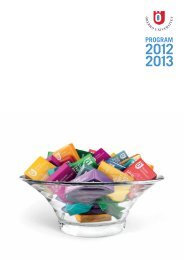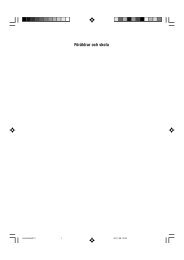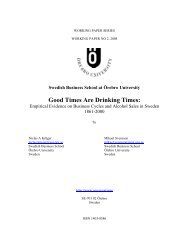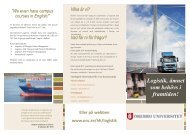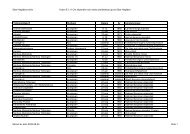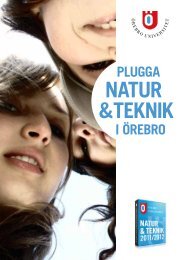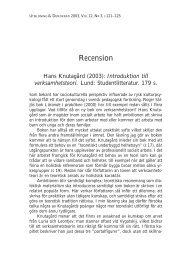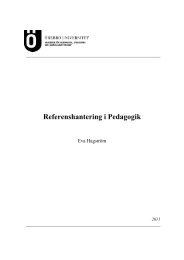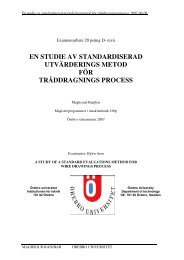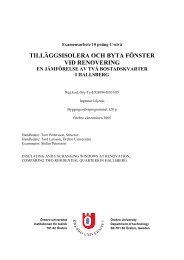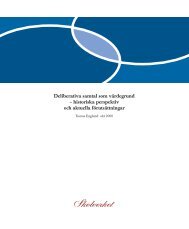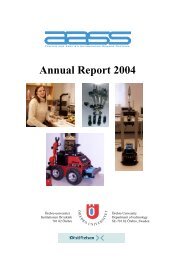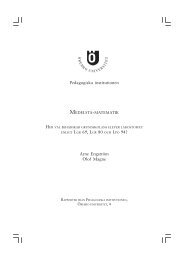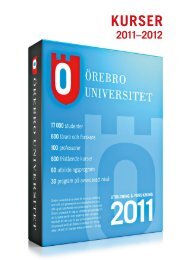Annual Report 2002 - Ãrebro universitet
Annual Report 2002 - Ãrebro universitet
Annual Report 2002 - Ãrebro universitet
You also want an ePaper? Increase the reach of your titles
YUMPU automatically turns print PDFs into web optimized ePapers that Google loves.
4 AASS – Center for Applied Autonomous Sensor Systems<br />
Preface<br />
The Center for Applied Autonomous Systems was formally established in 1996 at the<br />
Department of Technology with a grant from the KK-Foundation aimed at establishing the<br />
basis for a concentrated effort on interdisciplinary research in the area of Autonomous<br />
Systems with contributions to education. In the period 1996--<strong>2002</strong>, AASS has developed from<br />
a research group of 2 researchers and 2 PhD students to a full-fledged research center with 4<br />
professors, 2 Associated Prof. (Docent), 5 Phd, 22 Phd students, and 4 technical and<br />
administrative personnel. Now AASS plays an important educational role within the<br />
Department of Technology as well as has a leading position in the 4th strategic research<br />
profile of Örebro University - Human senses, autonomous sensor systems, and industrial<br />
processes. It also has achieved national and international recognition for its research results,<br />
and established well-functioning industrial cooperation. In the context of these achievements,<br />
AASS has, during year <strong>2002</strong>, also had a measurable societal impact in a number of ways such<br />
as<br />
1. Industrial relevance: continued cooperation with national/regional industrial companies<br />
such as ABB Automation AB, Bofors Defence AB, Aerotech Telub AB and SMEs like<br />
Amphitech AB.<br />
2. European dimension: co-operation within three EC research networks and a coordinator<br />
for a EU Marie Curie Training Site<br />
3. National dimension: Start-up of a VINNVÄXT VINNOVA initiative “Robotdalen”<br />
together with MdH Mälardalen, KTH/CAS Stockholm and a large number of industrial<br />
and societal partners.<br />
4. Public acceptance: Participation in CEBIT <strong>2002</strong>, Hannover, Germany and the Stockholm<br />
Technical Fair.<br />
However, our most important contribution with long-term societal impact is our educational<br />
activity. Improving the content, quality, and degree-level of the undergraduate education in<br />
The Department of Technology in general and in Computer engineering in particular is of<br />
highest priority. Thus undergraduate students with BSc, MSc, and Engineering degrees will<br />
remain our most important “output” - these students are to play important role in the<br />
development of regional and national industrial and business enterprises. At the same time<br />
research and graduate education will be key factors in keeping with up-to-date technological<br />
developments, maintaining and further developing the scientific relevance and quality of<br />
undergraduate education, and last but not least, increasing the attractivity of Örebro<br />
University as an educational center in a regional, national, and international perspective. On<br />
the other hand, our research and graduate education is of great value in itself -by doing<br />
research in the area of Autonomous Systems we contribute to the advancement of<br />
technologies at one of the frontiers of modern interdisciplinary science. A particular<br />
“practical” benefit is the reunification of Measurement, Control, and Computer Sciences into<br />
a disciplinary and technological continuum - a reunification that sadly is lacking today, to the<br />
growing discontent of industry. Thus, industrial cooperation will ensure that these<br />
technological advancements are adopted and their business potential is exploited.



